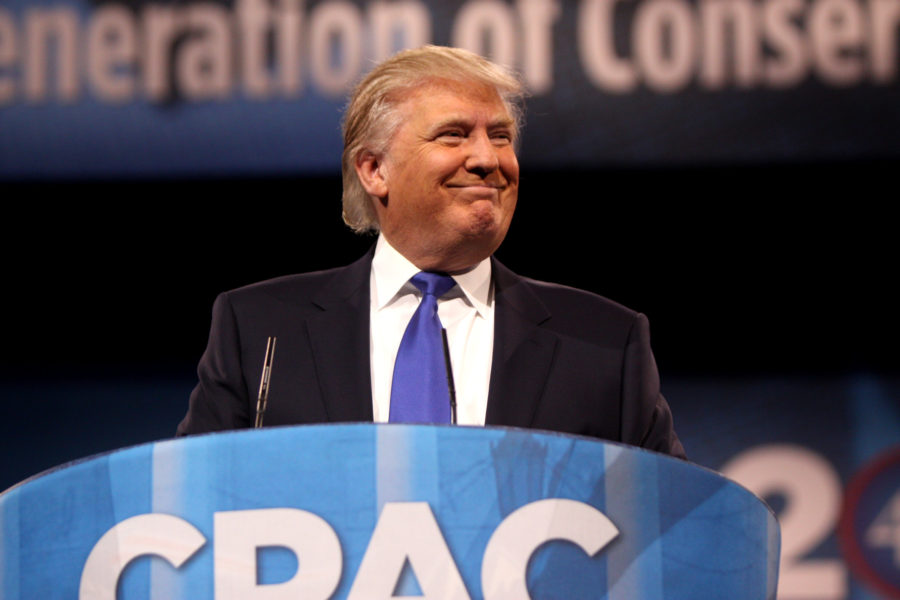Banning media outlets from briefings poses threat to democracy
Donald Trump’s decision to handpick media outlets is unconstitutional. Before the daily White House briefing with Sean Spicer Feb. 24, the Trump administration refused to let in reporters from CNN, The New York Times, Politico, BuzzFeed and many foreign press companies.
By banning media outlets who have previously published harsh things about Trump, he is excluding them from reporting important information citizens need to know.
The First Amendment states “Congress shall make no law… abridging the freedom of speech, or of the press,” so by limiting which media outlets are allowed at his press conference, he is going against the Constitution.
Although not allowing access is not the same as prohibiting the companies to publish something, it is a First Amendment attack. The new administration intends to prevent stories that might be viewed as negative by conservatives.
Trump’s staff only authorized reporters from mainly conservative media outlets such as Fox News, ABC and NBC. Trump has a history of being disrespectful to Democratic-leaning media outlets, such as tweeting from his personal account Feb. 15.
The fake news media is going crazy with their conspiracy theories and blind hatred. @MSNBC & @CNN are unwatchable. @foxandfriends is great!
— Donald J. Trump (@realDonaldTrump) February 15, 2017
With this statement, Trump endorses media companies that have more conservative tendencies while trying to steer people away from Democratic-leaning media outlets.
At the Conservatives Political Action Conference, Trump spoke just hours before the daily briefing. In his speech he claims to love the First Amendment more than anyone and states that it allows him to point out how wrong the “fake news” sources are.
At the conference he is recorded saying, “They get upset when we expose their false stories. They say that we can’t criticize their dishonest coverage because of the First Amendment … It gives you the right and me the right to criticize fake news and criticize it strongly,” during his speech at 11 a.m.
His statement appears to be acceptable and agrees with the First Amendment and what it allows. But just two hours later, he proceeded to prohibit media companies from entering a daily press briefing as an effort to stop “false reporting.”
According to The White House Historical Association, briefings remain as part of the current government system: “The sessions have survived because reporters found them useful for developing information, citizens saw them as valuable for making judgments about their chief executives.”
We need to know what the next ban is going to be and who it will involve. We need to know new laws he is going to propose, or when he will eventually replace Obamacare with something else. This type of information can be made available to the public through these meda companies, but he will not allow many of them.
By targeting media companies Trump does not like and not allowing them access to information that’s supposed to be made available to the public, he is making a decision to disobey the First Amendment.
As the citizens of this country, we need to acknowledge that these actions are more serious than what people would assume. It’s not just one case of Trump afraid of getting insulted, but it’s a threat to freedom. If enough people realize the severity of this action we can put an end to the dictator like government he is beginning to run.
On the day of the briefing, media programs including the Society of Professional Journalists tweeting using the hashtag #PressthePrez.
A free press means ALL press, not just those you like. #PressthePrez pic.twitter.com/rnDy1k8Cxq
— Society of Pro Journ (@spj_tweets) February 25, 2017
One reason this could be dangerous for our country is that it shows very close similarities to to political regimes where a person tries to demolish different viewpoints, limit the truth that gets out, and eventually control society as a whole.
In response to the ban, The New York Times ran an ad that ending with the phrase, “The truth is hard to find, the truth is hard to know, the truth is more important now than ever.” The link to the full video is here.
If companies like The New York Times are publishing videos and running ads during big events like the Oscars, it shows signs of danger and it should be a warning to the general public. If he is willing to violate the First Amendment and no one is going to call him out or notice the error, where will it stop?
by DEANNA PAYAN








![On the stage, Daniel Bozinovski and Rachel Treto play their part as Tom and Hannah in the show “The Cast List”. The show was about a group of students who were told about their cast list for the play “Romeo and Juliet.” The Theater I students were in preparation for their first showcase of the year. Students went over their lines during all of their class for the past two months. “[We put in] a lot of rehearsal, practicing lines, making sure you have everything memorized and making sure you are ready to go in and not forget anything,” Nathan Weeks said. Photo by Megan Kubas.](https://www.whitneyupdate.com/wp-content/uploads/2024/05/IMG_4085-600x396.jpg)
